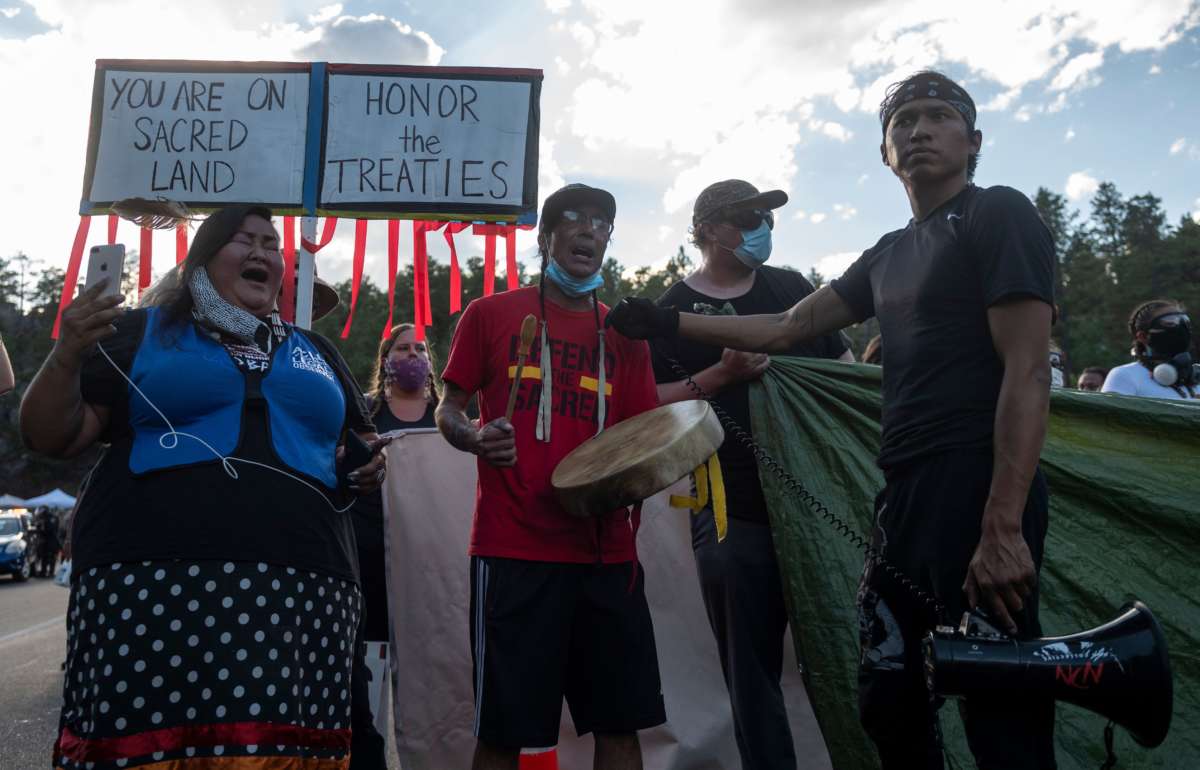Honest, paywall-free news is rare. Please support our boldly independent journalism with a donation of any size.
More than 100 treaty defenders and other protesters gathered on a highway leading to Mount Rushmore on Friday ahead of President Donald Trump’s speech at the monument.
The group blocked the road, holding banners and chanting slogans such as “We can’t breathe” and proclaiming treaty rights. They carried signs with messages such as, “End 500 years of Genocide,” and “It’s a good day to do the right thing.”
At one point, Native women in ribbon skirts created a line across the highway, behind them members of NDN Collective, a nonprofit Native advocacy organization, parked white vans across the road and deflated the tires. Protesters later removed the wheels and climbed on top of the vans, shouting “Land back!”
The gathering took place near a checkpoint at Highways 16/244 where ticket holders for Trump’s South Dakota event were being screened. Some treaty defenders got into heated exchanges with people driving to Mount Rushmore.
Around 5 p.m. local time, law enforcement started telling defenders to vacate the area or face arrest, saying the blocking of traffic was an unlawful assembly. They directed them to head to a designated “free speech zone.”
Law enforcement officers dressed in riot gear held shields and formed a line across the road, pushing up against a group of protesters.
“We don’t need them to give us permission to do this on our land; we intend to stay here indefinitely throughout the night,” said Nick Tilsen, Oglala Lakota, of NDN Collective. “Mount Rushmore is a symbol of white supremacy. When you carve out four white men who conducted genocide against Native people in this sacred place, it is fundamentally wrong.”
Some people began to disperse but later returned, as the vans continued blocking the road. Law enforcement then brought in tow trucks to haul them away.
Trump supporters standing behind and near the police line shouted at treaty defenders. A man claiming to be a veteran repeatedly offered his help to police.
After the vans were towed, a small group of treaty defenders continued blocking the highway, holding a large “#LandBack” banner.
At 7 p.m., police arrested them, using zipties to secure their hands behind their backs and leading them off the road. Trump supporters shouted accusations that the defenders were funded by George Soros, founder and chairman of Open Society Foundations and frequent target of right-wing conspiracy theorists.
About 15 people were arrested, The Associated Press reported. Tilsen was among them.
NDNCollective's Nick Tilsen just arrested defending the Paha Sapa, standing against white supremacy and for collective liberation in these empowering times. Please contribute to NDN's legal fund to bail out all of our arrested relatives who stood strong today. Link in comments. pic.twitter.com/wwtf9ZN05U
— Sarah Sunshine Manning (@SarahSunshineM) July 4, 2020
Several groups of Natives had planned to travel to the monument to voice their opposition to Trump’s visit, his policies that are seen as challenges to tribal sovereignty and the very presence of Mount Rushmore, which features faces of American presidents carved into a mountain held sacred by many tribes in the region.
Among those gathered at the highway Friday was Krystal Two Bulls, an Army veteran and founder of Voices of the Sacred, an organization aimed at empowering Native youth.
“We need to be bringing out the roots of what we’re talking about,” she said in a livestreamed video of the protest. “This country was founded on white supremecy,” including the genocide of Natives and slave labor of Black people.
“This is a major convergence that we’re seeing today,” said Two Bulls, Oglala Lakota and Northern Cheyenne. “All these people standing together across the country.”
The Black Hills are part of the Fort Laramie Treaty of 1868, and the country’s highest court ordered compensation in the millions of dollars to the Lakota for their illegal seizure, an offer the Lakota have refused for decades. They instead want the Black Hills returned to tribal authority.
Mount Rushmore is considered a national memorial by the National Park Service and is the state’s prized tourist destination, attracting nearly 3 million visitors each year.
The South Dakota Department of Tourism created a lottery system allowing 7,500 people to attend Friday night’s program, in which fireworks were scheduled to be set off at the monument for the first time since 2009.
The 6 p.m. deadline for entry to the event passed with many cars still waiting to enter the memorial, though they eventually got through.
Earlier in the evening, Tilsen tried to negotiate with the National Park Service on the removal of treaty defenders and the vans parked in the middle of the road.
“We ain’t going nowhere,” he said. “This is our land. This has been our land for thousands of years.”
Trump is silencing political dissent. We appeal for your support.
Progressive nonprofits are the latest target caught in Trump’s crosshairs. With the aim of eliminating political opposition, Trump and his sycophants are working to curb government funding, constrain private foundations, and even cut tax-exempt status from organizations he dislikes.
We’re concerned, because Truthout is not immune to such bad-faith attacks.
We can only resist Trump’s attacks by cultivating a strong base of support. The right-wing mediasphere is funded comfortably by billionaire owners and venture capitalist philanthropists. At Truthout, we have you.
Truthout has launched a fundraiser, and we have only 48 hours left to raise $21,000. Please take a meaningful action in the fight against authoritarianism: make a one-time or monthly donation to Truthout. If you have the means, please dig deep.
